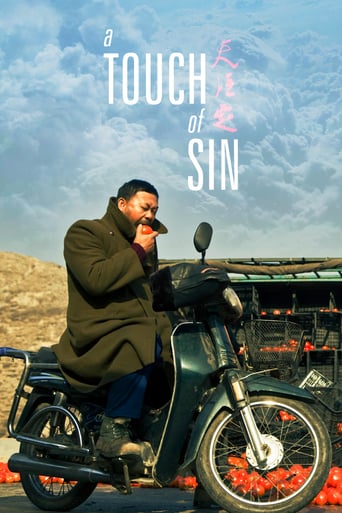



Nice effects though.
just watch it!
Disturbing yet enthralling
All of these films share one commonality, that being a kind of emotional center that humanizes a cast of monsters.
View MoreBeautiful movie about living at the bottom of the economic class may lead to random violent acts of aggression - as your only way of releasing the anger inside - , it was close but didn't quite make it ..Story could have been told more visually , with less but useful dialogue , as the cinematography and beauty within the scenes are amazing . But like most art-houses the story doesn't fully add up . -----------------------------------------------------Part 1: A man living in a village getting drained by the coal mine industry reaches his ultimate limit - and takes out everyone involved in the corporate scandal 8/10Part 2: A motorcyclist with an excitement to gun violence ; sibling in an aging family, he "robs" people as his way of making a living 5/10Part 3: A woman is having an affair with a married man but calls it quits for fear it'll ruin her image . Being false accused for being a slut , she makes a drastic decision. 6.5/10Part 4: A kid gets blamed for injuring a coworker and has to pay his debt through checks for the next 100 days . He calls quits instead and decides to fall in love with a sex worker during his free time . When his life reaches a dead end he decides to end it there . 7.5/10Overall 7/10 6/10 Script 9/10 Level of Violence 11/10 Violence Shock Value (Realism of Violence) 100/10 Beauty of the Cinematography
View MoreThe director has so much to express, which makes the film loose. He wants to show the whole picture of modern China by referencing lots of news in the stories. But it weakens the story itself. The fourth fragment is most representative. It seems not so reasonable.A few actors are great, like Wu and Tao, while others do not their roles. Baoqiang is not ferocious enough as a professional robber. Some guest actors are unnecessary, even ruin this movie, such as Sanming.Anyway, we should show respects to both Zhangke and this movie. He really wants to express his anxiety about this sick society. He reminds us this situation is unstable and unsustainable. We are on the edge of a crash.
View MoreIn Jia Zhang-ke's A Touch of Sin four individuals revolt against their oppressive lives in contemporary China. It's one of those films whose backdrop is so rarely seen and fascinating we're tempted to ignore the narrative for it. But the stories are too strong to miss.In a small northern town a loner in a green coat campaigns against the local politicos who have grown obscenely rich by skimming off the money from their sale of the collectively owned mine. The two main symbols are the Mao statue in the town square, all but ignored now, and the Maserati the boss bought and leaves outside his factory. The hero snaps and guns down everyone in his way to the boss, whom he kills at the Buddhist temple.The second hero returns home on his motorcycle in a Chicago Bulls cap, to find the region scarred by high rises and the Three Gorges hydroelectric plant. The scenes seem like the usual awkward homecoming, till we learn he's just killed three men.In the fourth story a young man leaves his factory job when he's expected to give his salary to a co-worker who badly injured his hand in a work accident. The boy works as a waiter in a high-priced brothel, where he's attracted to a young whore who reveals she's working to provide for her little daughter. Seeing no escape from the web of poverty and corruption the lad kills himself. In the third story a sauna receptionist has broken off with her married lover. When a wealthy man flogs her with his bankroll to bully her into sex she kills him and wanders off bloodied and distracted. She returns in an epilogue, rehabilitated, applying for a job in different part of the country. When she watches a street theatre company the lead peers out at the audience and asks: "Do you know your sin?" But the camera holds on the audience, everyday faces, not the ones whose stories we have stumbled into. The implication is that while we have watched characters driven by ideals and desperation into sin perhaps there is a heavier sin among those prosaic citizens who have quietly put up with everything. If our four heroes have committed "a touch of sin," the collective sins of omission weigh heavier still. For more see www.yacowar.blogspot.com.
View MoreAfter some moments of silence, the master of the sixth generation of Chinese filmmakers, Jia Zhangke returns with his newest feature "A Touch of Sin" (2013) which might just be his darkest work to date. It's an intriguing film of sheer brilliance told through the complexity of several, loosely connected stories about people in agony. While some fans of the director may be disappointed by the lack of clairvoyant lyric beauty, characteristic for example for "Still Life" (2006), others may find the narrative ambiguity and incoherence rather enriching. The film begins with an enigmatic scene at a deserted rural highway where a truck carrying tomatoes has fallen over. A cold sense of brutality breathes in the air. Soon the first characters are introduced and we learn that, in the same way as in "Still Life", "A Touch of Sin" is structured from different stories with different human fates. In brief, it tells the story of four random acts of violence in today's society.Although the stories lack obvious connection, they all share a few essential elements. First of all, they all escalate to an outburst of violence. Second, all of them are tales of social rootlessness and existential alienation. The latter remark is congruous with the fact that in all of Zhangke's films the general aspect meets the particular in a poignant fashion of chill and solitude. Individuals live in their personal prisons while the modernization of the society brings nothing but empty freedom. In other words, they live in spaces that are both private and public where they feel utterly detached. No one belongs anywhere in the Zhangke universe. Due to the complexity of several stories, the film also includes more than one central milieu. However, this seemingly arbitrary set of different settings of hotels and a coal miners' town do tell us about veritably similar subjects. All the spaces are haunted by the same problems. Such conflict of ambiguity and coherence should not frighten the spectator. Since instead of a straight-forward narrative with clear character delineation, Zhangke offers us a fascinatingly cynical cross-section of the contemporary Chinese society which is, on the one hand, characterized by economic boom to whose technological wonderland an individual may vanish, and, on the other, the tormenting but also comforting legacy of Mao. Modern Chinese way of life appears to Zhangke as something diverse -- as something that is in a constant state of change. Like in his previous features, Zhangke once again focuses on the transforming reality, the current flow, and its consequences on the individuals. Although this was already done to an extent in "Still Life" through the complexity of two overlapping stories, it also cast hope in humanity, whereas "A Touch of Sin" is far more pessimistic. Once again Zhangke's aesthetics of cinema is characterized by the elements of silence and emptiness in the images of loneliness and alienation. It is as though everything had died. Only violence is portrayed passionately, all the rest is understated. The violence in "A Touch of Sin" is raw and brutal, but essentially stripped. Above all, violence appears as a melancholic undertone of some kind which reveals the realities of the society. Even if the opaque and complex narrative of "A Touch of Sin" left the viewer speechless and unable to describe what he or she had just seen, there is always something profound to admire in Zhangke's cinema. In his films there is always that certain mood which is quite difficult to be put in words. In brief, it is a mood of emptiness, but also of utter richness.
View More